- AI
- Arbitration
- Asia
- Automobile
- Bangladesh
- Banking
- Biodiversity
- Biological Inventions
- bLAWgathon
- Brand Valuation
- Business
- Celebrity Rights
- Company Act
- Company Law
- Competition Law
- Constitutional Law
- Consumer Law
- Consumer Protection Authority
- Copyright
- Copyright Infringement
- Copyright Litigation
- Corporate Law
- Counterfeiting
- Covid
- Design
- Digital Media
- Digital Right Management
- Dispute
- Educational Conferences/ Seminar
- Environment Law Practice
- ESIC Act
- EX-Parte
- Farmer Right
- Fashion Law
- FDI
- FERs
- Foreign Law
- Gaming Industry
- GDPR
- Geographical Indication (GI)
- GIg Economy
- Hi Tech Patent Commercialisation
- Hi Tech Patent Litigation
- IBC
- India
- Indonesia
- Intellectual Property
- Intellectual Property Protection
- IP Commercialization
- IP Licensing
- IP Litigation
- IP Practice in India
- IPAB
- IPAB Decisions
- IVF technique
- Judiciary
- Khadi Industries
- labour Law
- Legal Case
- Legal Issues
- Lex Causae
- Licensing
- Live-in relationships
- Lok Sabha Bill
- Marriage Act
- Maternity Benefit Act
- Media & Entertainment Law
- Mediation Act
- Member of Parliament
- Mergers & Acquisition
- Myanmar
- NCLT
- NEPAL
- News & Updates
- Non-Disclosure Agreement
- Online Gaming
- Patent Act
- Patent Commercialisation
- Patent Fess
- Patent Filing
- patent infringement
- Patent Licensing
- Patent Litigation
- Patent Marketing
- Patent Opposition
- Patent Rule Amendment
- Patents
- pharma
- Pharma- biotech- Patent Commercialisation
- Pharma/Biotech Patent Litigations
- Pollution
- Posh Act
- Protection of SMEs
- RERA
- Section 3(D)
- Signapore
- Social Media
- Sports Law
- Stamp Duty
- Stock Exchange
- Surrogacy in India
- TAX
- Technology
- Telecom Law
- Telecommunications
- Thailand
- Trademark
- Trademark Infringement
- Trademark Litigation
- Traditional Knowledge
- UAE
- Uncategorized
- USPTO
- Vietnam
- WIPO
Technology is taking over our daily lives at an unprecedented scale, but is our laws & the legal systems revamping itself at a similar scale, is the question of the hour. Because if the answer is in negative, then we are swimming in troubled waters. The present article discuss issues faced by our Music Industry with the advent of technology.
The creators, producers who record their work of music/ music composition own copyrights over these works. After which, the record labels through its promotion got people to buy the music at the stores, where people can buy it physically.
Music distributors used to enter into Music License agreements (An agreement between a third party and creator for use of composition) with the Music Stores and then, the stores use to deliver music to the listeners. But, with the growth of Internet everything went online and music industry wasn’t spared. With digitization, Online Music stores came into existence. Now the composers could also give selective or absolute rights to third party like Saavn , iTunes, Gaana.com YouTube etc. Recently, Music Licensing went online and an online portal named PLUS (Performance license of usage of Sound Recording) has been established by Phonographic Performance Limited or PPL, to avail online music license, and provide online payments within minutes. This article explains how this is a revolutionary step as far as music industry is considered.

What is Music Licensing, anyway?
Music Licensing is a process of taking permission for the use of Musical composition/work. For that matter, the Licensor and Licensee enter into a License Agreement to use that music; The License Agreement also entails its conditions of use and specifies the time period for using that music and lastly, how the royalties will be provided to the licensor. This process is governed by the Copyright Act, 1967.(Royalty means a payment made to the legal owner for the use of Property.)
How does this work?
All those who play pre-recorded music of the members of PPL, for any non-private purposes or public performance or commercial purpose, whether by way of CDs, Gramophone Records, Radio, and Music Cassettes or cable network or TV, must obtain a license and provide the payments for the same. PPL provides annual Background License (If one plays our sound recording on a daily basis) and Event License (If one plays our sound recording for a particular event for a specified day).

To obtain a license, the person has to apply for the music performance license and has to contact the nearby facilitation centre, where we have to give all the relevant information needed. After that, a quotation will be shared with you with a payment link or Bank detail and we have to pay through these modes- NEFT/RTGS/IMPS/DD/Cheque. Cash Transactions are strictly not allowed.
Once, we obtain the music license digitally then, we can easily play the Music in every form or method.
Now, let’s see how this complicated process affected the Industry.
According to the Music Consumer Study 2018, the old licensing process or the physical licensing process, contributed only 10.7% in the streaming revenue of the overall market. Only 5% of the businesses took a license for the purpose of public performance licenses for the music they play. However, after the introduction of digital distribution, where people can take online license as well as can make online payments, the digital sales contributed to the revenue to 78.5%. Currently, the value of the digital music licensing industry is Rs. 665 Crore.
Why is this a Revolutionary Change?
As PPL introduces the online portal which is PLUS, through which one can obtain a license to use the sound recording in public platform and can make online payments to the owners of the sound recording, a proliferation in the streaming revenue has been clearly witnessed. This portal has been introduced to speed up the collection of revenues as well as for creating an atmosphere of transparency.

In earlier times, a major obstacle in obtaining the music license was the long and burdensome procedure.. By, introducing this simple and easy process, people who want to obtain the music license, can get the license in no time.
Also, I would like to cite a statement made by the Chief Digital Officer of PPL in regards to this online portal “In 6 months of implementation, PLUS has proven to be a versatile yet simple tool. We’ve already seen strong measurable results in the form of reduced turn-around-time and positive customer feedback. Soon, we plan on expanding its functionality to allow prospective customers to create their own licenses i.e. a DIY (do it yourself) portal. This will further simplify the application process and essentially allow anyone in India with a Smartphone or computer to apply for a PPL License with just the click of a button.”
So, as a concluding remark, we would like to say that it is a very helpful/easygoing process through which the businesses/users can take the music license in a more simplified manner. Through, this versatile process, the revenue generation is growing very rapidly and in a smooth manner. This online portal is a cost effective as well as time efficient step taken by PPL. Many sectors in India are still not digitized have been totally disdained but, it is high time that we understand that our system/framework/setups need to adapt with technology. If you don’t adapt to the situation you die is what have been stated by Darwin long back. Digitization is a way of ensuring maximum compliance and development of our society.
Author: Mr. Shubham Borkar, Senior Associate – Litigation and Business Development and Vaishvi Khare – Intern, at Khurana & Khurana, Advocates and IP Attorneys. In case of any queries please contact/write back to us at shubham@khuranaandkhurana.com or at www.linkedin.com/in/shubhamborkar.
References:
https://blog.ipleaders.in/music-license-agreement/
PPL, How do I obtain license(FAQ’s), https://pplindia.org
IFPI, Digital Music Study, (2018), https://Indianmi.org
4 thoughts on “Online Music Licensing in India (PLUS) and How is this a revolutionary change?”
Leave a Reply
You must be logged in to post a comment.




Sir i want to know that how can I get license of various songs and dialogue to use in my tiktok like app as library for user
Hi Jeet, Kindly read this (https://www.khuranaandkhurana.com/2020/04/07/tiktok-clock-ticks/) article to clear your doubts.
I have contacted to PPL India and IPRS , none of them are providing digital music or streaming licence in India. They are saying please contact directely to the music label.
Dear Neeraj,
The License for the use of the music can be provided by PPL only in the cases of its members. In case of non-member the license is to be obtained from the label or the creater of the music as they are the first owner of the work.